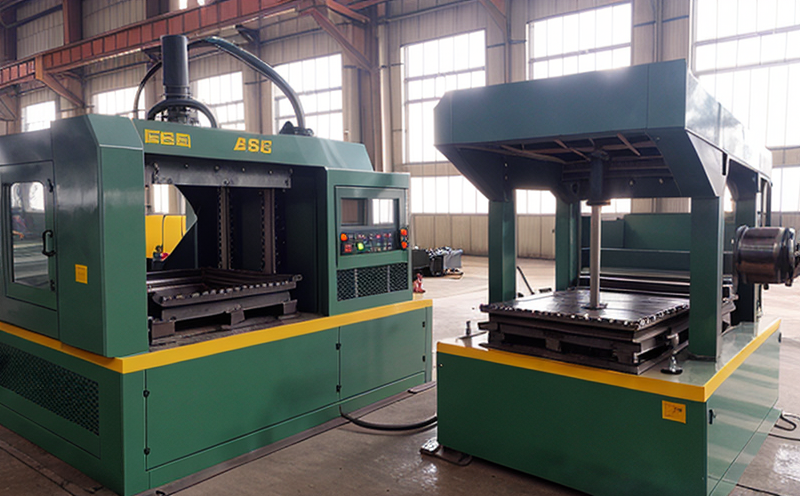Forging, Stamping & Forming Process Testing
The forging, stamping, and forming processes are critical in industrial manufacturing where materials undergo significant deformation to achieve desired shapes and properties. These processes involve subjecting metals to high temperatures and pressures, which can lead to material defects such as cracks, uneven grain structures, or residual stresses.
Forging involves shaping metal by applying localized compressive forces using external hammers, presses, or rolls. Stamping, on the other hand, typically refers to a cold-forming process where materials are shaped through dies and punches without heat treatment. Both processes play a vital role in producing high-strength components used in various industries like automotive, aerospace, defense, and construction.
Proper inspection and testing of these processes ensure product quality, safety, and compliance with international standards such as ISO 9001:2015 for quality management systems. In this context, Eurolab offers comprehensive testing services to verify the integrity and reliability of materials used in forging, stamping, and forming operations.
Our advanced facilities include state-of-the-art equipment like X-ray fluorescence (XRF) spectrometers, optical profilers, and ultrasonic flaw detectors. These instruments allow us to assess material composition, surface finish, and internal defects with precision. For example, using XRF analysis helps determine the chemical composition of metallic alloys, ensuring they meet specified requirements.
Another important aspect is dimensional accuracy. Precision metrology tools enable us to measure part dimensions within micrometers, guaranteeing that products fit together correctly in assemblies. This level of accuracy is crucial for complex components like engine pistons or aircraft landing gears where even slight deviations could compromise performance and safety.
Residual stress measurement also forms a significant part of our testing services. High levels of residual stresses can lead to premature failure of components under service conditions. By employing techniques such as neutron diffraction, we can quantify these internal strains accurately. This information aids manufacturers in optimizing heat treatment cycles or selecting appropriate materials.
For quality assurance purposes, Eurolab follows stringent acceptance criteria defined by relevant standards like ISO 15614-2 for non-destructive testing methods used during forging operations. Compliance with such guidelines ensures consistency across all batches produced by different facilities around the globe.
Eurolab Advantages
Eurolab prides itself on offering unparalleled expertise and cutting-edge technology tailored specifically for industrial manufacturing & processing testing services. Our team comprises highly qualified professionals with extensive experience in material science, mechanical engineering, and quality assurance.
- State-of-the-art equipment: We leverage the latest advancements in analytical instrumentation to deliver precise results.
- Comprehensive service portfolio: From initial consultation through final report generation, we cover every stage of your project needs.
- Global recognition: Our certifications and memberships with reputable bodies like ASTM and ASME reflect our commitment to excellence.
- Cost-effective solutions: By streamlining processes and optimizing resource utilization, we help reduce overall costs without compromising quality.
The combination of these factors makes Eurolab the preferred choice for companies seeking reliable and accurate testing services. Whether you're developing new products or validating existing ones, our dedicated professionals are here to support your every step along the way.
Why Choose This Test
Choosing forging, stamping, and forming process testing is essential for ensuring product quality and safety throughout various stages of manufacturing. Here’s why:
- Preventive Maintenance: Identifying potential issues early through regular inspections helps maintain equipment efficiency and extends service life.
- Compliance Assurance: Meeting regulatory requirements ensures smooth operations and avoids costly penalties.
- Enhanced Product Reliability: Robust testing identifies weak points in design or manufacturing, leading to improved product performance.
- Cost Savings: Early detection of defects reduces rework costs significantly while maintaining competitive pricing structures.
In summary, investing in comprehensive testing not only protects your reputation but also contributes positively towards long-term business sustainability. At Eurolab, we stand ready to assist you with all aspects of this vital process.
Use Cases and Application Examples
| Use Case | Description |
|---|---|
| Forging Process Monitoring | Continuous monitoring during forging ensures uniform heating, optimal pressure application, and consistent part dimensions. |
| Stamping Quality Control | Regular checks on stamped parts help maintain dimensional accuracy and surface quality standards. |
| Forming Operation Validation | Testing after forming helps confirm the integrity of complex shapes formed under extreme conditions. |
| New Product Development Support | Prototype evaluation through these tests provides valuable insights into material behavior and process effectiveness. |
- Automotive Industry: Ensuring compliance with crashworthiness requirements by validating structural integrity of stamped parts.
- Aerospace Sector: Verifying strength and fatigue resistance of forged components subjected to severe environmental conditions.
- Bridging Construction: Guaranteeing durability and load-bearing capabilities of formed structures exposed to varying loads over time.
These examples illustrate just some of the ways Eurolab's testing services enhance industrial manufacturing processes. By leveraging our expertise, you can achieve superior product quality while adhering to strict industry regulations.





